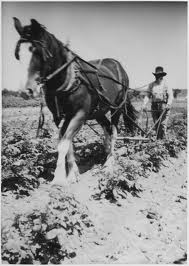 Modern society is vastly complex and so hyper-specialized that very few of us are in a position to be able to see the effect of our daily work processes rendered into an actual outcome. I have spent many a day in a cubicle in a fluorescent-lit hell, worrying whether I remembered to attach the cover sheet to my TPS report.
Modern society is vastly complex and so hyper-specialized that very few of us are in a position to be able to see the effect of our daily work processes rendered into an actual outcome. I have spent many a day in a cubicle in a fluorescent-lit hell, worrying whether I remembered to attach the cover sheet to my TPS report.
It is pretty much the same all over. Very few people are in a position to really be responsible for a product from conception to fruition. Most of the world just doesn’t work that way anymore.
One of the exceptions is farming. Farmers are intimately connected with their work and their product. They are in the rare position of being able to literally see the fruits of their labors. They till the soil, plant the crop, fertilize the crop, fight weeds and pests as best they are able. At the end of it all they harvest and sell what they wrought from the earth by the sweat of their own brows. They feed the world.
I think another exception is the writer. We are in it every step of the way, from conception to submission for publication. We till the blank page and plant our words, tending and caring for the plot and the characters, weeding out every flaw as best we are able. At the end of it all, we publish what we have wrought from thin air by the sweat of our own fervent imaginations. We feed the minds of the world.
Writers and farmers share something else. However much the skill and care we take in producing the finest we are able, there will be some who will not like it simply for what it is. Some people do not like broccoli. Some people do not like paranormal fiction. It does not matter. We will each return—the farmer to his field, and the writer to the new blank page, and we will work through another season.
There is one area in which writers have an added satisfaction that farmers do not attain. People will let the world know how they liked our books. As far as I know, no farmer has ever gotten a fan-letter praising his corn or wheat. He has never sat down to read a review of his beans or carrots in the paper. He will not ever receive an award, however worthy his effort.
These may be the last few areas where one person makes all the difference. For me, that is the biggest attraction to writing. I feel connected to the work and the end product. I still felt that connection during my collaboration with Kat and JD in writing Bad Book. The fear of losing that connection was the one thing that had held me back from collaborating with other authors before. We made a good team and I’m proud of what we accomplished. We grew a fine book together. You really should read it, but then, you also should eat your broccoli.
* * * * *
Stephen Hise is an author and the Founder and Co-Administrator of Indies Unlimited. For more information, please see the IU Bio page and his website: http://stephenhise.com/
[subscribe2]

As a person who wears two hats, one as a writer and one as a farmer, I whole heartily agree with your post. thanks
I salute you Bill. 🙂
Me too, farmer and indie author. And right now I'm waiting for a BIG storm to hit. Haven't got the crops in the ground yet, but I'm working on a book I hope to have out July. Never a dull moment in these two worlds.
http://sturgeoncreek.blogspot.com/
And thank a farmer. Thanks, Stephen for the great post. Also for one fine collaboration!
Thank you Laurie. 🙂
I live in a somewhat farming area – called the breadbasket of the world by some. There is a bumper sticker that is very popular here "Farmers Feed Cities" another says "If you ate today, thank a farmer". They are so under-appreciated. As are we.
True Yvonne. Thanks for the comment. 🙂
Thank you for the reminder. I’ll think of this post while I’m in fluorescent hell on Monday wondering again why I get up at dawn and go straight home every night just for another few hours on the computer. Maybe I’ll cook a little broccoli in your honor.
Well said, that man. It makes me want to review that sandwich I just ate: “Its thematic consistency was provided by the underlying wheat, thanks to the subtle sowing and harvesting skills of Farmer Jones. The bacon clearly emerged from a compelling confluence of happy pigs and organic animal feed, which tied the tonal elements together, while the lettuce…” Okay, I’ll shut up.